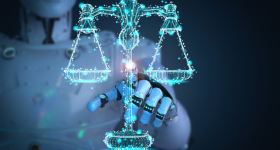First Amendment Expansionism and California’s Age-Appropriate Design Code
Professor Solove explains how the recent decision in NetChoice v. Bonta is part of a new breed of opinion he labels "First Amendment Expansionism."


The Bernard Center provides education, events, scholarship, and dialogue about intellectual property, privacy, data security, and technology law. Internally, the Bernard Center is divided into two important areas of academic areas within GW Law:
GW Law proudly unveils its Center for Law and Technology, focusing on Intellectual Property and Privacy and Technology Law.
GW Law recently added a new JD Concentration in Privacy, Data Security and Technology (PDT) Law.
GW JOLT will present articles, essays, and student notes on law and technology issues including, intellectual property, privacy, artificial intelligence, cybersecurity, digital health, online social media, behavioral advertising, and other existing and emerging areas of technology related law.
Download the Bernard Center Brochure (PDF)

Scholarships and competitions are available for both programs.
Learn more about this once-in-a-lifetime study abroad opportunity.
Center Faculty Co-Director; Co-Director, Intellectual Property Law Program
rbraun law [dot] gwu [dot] edu (rbraun[at]law[dot]gwu[dot]edu)
law [dot] gwu [dot] edu (rbraun[at]law[dot]gwu[dot]edu)
Center Faculty Co-Director; Bernard Professor of Intellectual Property and Technology Law
dsolove law [dot] gwu [dot] edu (dsolove[at]law[dot]gwu[dot]edu)
law [dot] gwu [dot] edu (dsolove[at]law[dot]gwu[dot]edu)
Center Director; Associate Dean, Intellectual Property Law
jwhealan law [dot] gwu [dot] edu (jwhealan[at]law[dot]gwu[dot]edu)
law [dot] gwu [dot] edu (jwhealan[at]law[dot]gwu[dot]edu)
Center Deputy Director; Bernard Assistant Dean, Privacy and Technology Law
adrienne [dot] fowler law [dot] gwu [dot] edu (adrienne[dot]fowler[at]law[dot]gwu[dot]edu)
law [dot] gwu [dot] edu (adrienne[dot]fowler[at]law[dot]gwu[dot]edu)

First Amendment Expansionism and California’s Age-Appropriate Design Code
Professor Solove explains how the recent decision in NetChoice v. Bonta is part of a new breed of opinion he labels "First Amendment Expansionism."

A Database from GW Law Informs Users on Litigation Relating to AI
The shifting legal landscape surrounding artificial intelligence is commanding attention, says Professor Robert Brauneis.
MSNBC’s "Velshi" | Mary Anne Franks - September 28, 2025
MSNBC’s "Velshi" featured Mary Anne Franks on Trump, the First Amendment, insincere debate, and blurred lines between government and culture.
"Nobody Wants to Talk About Charlie Kirk’s Actual Legacy"
Slate quoted Mary Anne Franks on the matter that the First Amendment has either "swallowed itself, or the country has turned it upside down.”
Texas Tribune quoted Mary Anne Franks saying a law framed as positive actually fuels anger at higher ed, vilifying students and universities as intolerant.
Please fill out our contact form to get in touch with the Bernard Center.
